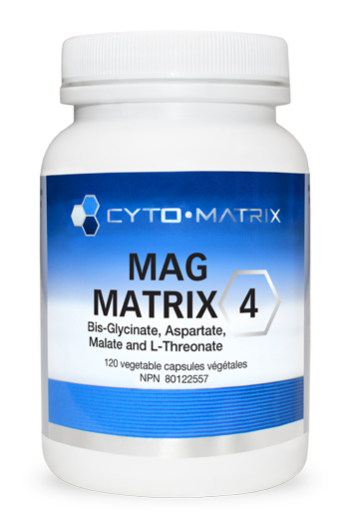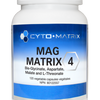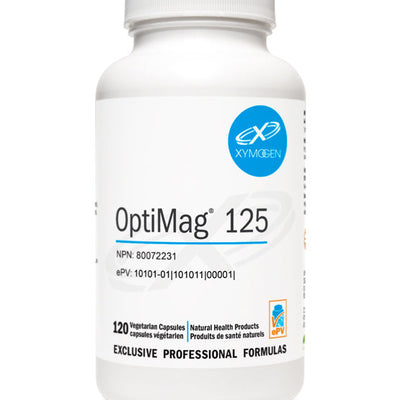

Alternate product below

You have a question?
Need support? Talk to one of our advisors.
Description
Dosage
Nutritional information
100 mg of elemental magnesium per capsule, in a blend of four forms. Magnesium di-malate is a targeted form of magnesium for people suffering from fibromyalgia syndrome, muscle fatigue, muscle aches, and chronic fatigue syndrome. Magnesium aspartate helps increase cellular energy production and has been shown to have a positive effect on fatigue. Magnesium bisglycinate is widely considered one of the best absorbed and digestively tolerated forms of magnesium. Threonic acid is a water-soluble substance that forms when vitamin C is broken down in the body. Combining magnesium and threonic acid produces magnesium L-threonate. Magnesium is one of the most important minerals for our health. It is needed for the proper functioning of nerves and muscles by regulating calcium, creating cellular energy in the mitochondria, and acting as a cofactor to build DNA, RNA, and many proteins. Despite its great importance, magnesium is commonly deficient in the Canadian population due to poor diet, medication depletion, and stress. Suboptimal magnesium levels create a pro-inflammatory state in the body with numerous health implications. As research grows on the benefits of magnesium for human health, it is difficult not to consider supplementation in most patients. Clinical trials and large-scale evidence have shown that magnesium can be helpful in many health conditions. However, it appears that certain forms of magnesium are better suited to specific conditions, physiological systems, or targeted symptoms, and there is not always a one-size-fits-all approach to finding the best magnesium supplement for each individual. Ultimately, magnesium can be offered in many complementary forms, each with advantages and disadvantages. For example, magnesium oxide is one of the most widely used and studied forms of magnesium. This magnesium blend is cost-effective and can be administered in relatively large doses per standard capsule, but it is well known to induce a laxative effect on the intestines, making it less desirable for many people. Other forms of magnesium may offer unique and tailored benefits without such a trade-off. Magnesium malate has been studied for its ability to reduce pain and tenderness in people with fibromyalgia. This is likely due to the fact that malate is a substrate found in mitochondria that is used to create cellular energy. A similar approach to cellular energy production involves magnesium aspartate, a supplemental form of magnesium that has been shown to positively affect fatigue and muscle hyperexcitability. When it comes to bioavailability, magnesium bis-glycinate has advantages. Magnesium bis-glycinate is a form of magnesium that combines one molecule of magnesium with two molecules of glycine, an inhibitory amino acid. This chelated bond is advantageous because it remains stable throughout the digestive tract, preventing magnesium from binding to other compounds. The presence of glycine also allows the molecule to access dipeptide transport sites. Ultimately, this results in better absorption and tolerance. Cyto-Matrix's Mag Matrix 4 combines these four forms of magnesium to deliver the synergistic benefits of magnesium without compromise. Each capsule offers 100 mg of elemental magnesium in a well-absorbed and well-tolerated blend. 120 vegetarian capsules per bottle.
Adults: (14 years and older) - Take 1 capsule, 1 to 3 times daily.
Medicinal Ingredients: Magnesium (Albion™ magnesium bisglycinate chelate*, Albion™ di-magnesium malate*, magnesium L-Threonate, magnesium aspartate) 100 mg Non-medicinal Ingredients: Hypromellose, magnesium stearate, microcrystalline cellulose.
Courteous and personalized customer service
Fast delivery throughout Canada
Google review with an average of 5 stars